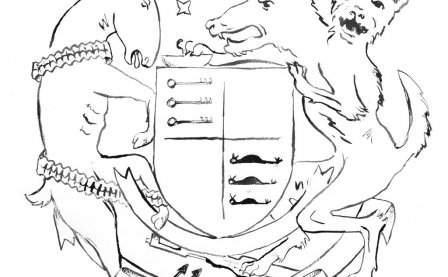Unlike other artists who eschew the songwriting ‘thought process’ while spouting nose-in-the-air, pie-in-the-sky proclamations that ‘this stuff just comes to me,’ Polly Jean Harvey is brewing, concocting, theorizing. She’s decidedly on the outskirts: while iPods are jiggling with the Shuffle function as song-after-song albums continue to decline, PJ Harvey has shown her undying predilection toward the dying notion of a “concept album.” In fact, it’s the concept that’s so intriguing about her latest. While albums like Stories from the City, Stories from the Sea and To Bring You My Love found her looking inward — Let England Shake sees her peeking beyond her inner observations into the complicated web of English politics.
Joined by her constant companions and musical collaborators John Parish, drummer Jean-Marc Butty, and Mick Harvey (formerly of the Bad Seeds), Let England Shake opens with a crashing combination of tinny autoharp and vocals, resting in an oddly comfortable place between slick and squeaky. On “The Last Living Rose,” the political analogies hit a high note (pun pretty much intended) as the track recalls the memorable tambourine beat from Uh Huh Her’s “Pocket Knife.” But instead of threatening her adversaries who would have her settle down, Harvey has some strong words for those “goddamn Europeans.” “Let me walk through the stinking alleys/ To the music of drunken beatings/ Past the Thames river glistening/ Like gold hastily sold for nothing,” cries Harvey while dull, droning saxophones blare in the background.
The controversy is ramped up when Harvey comments on war during the rhythmically marching “The Glorious Land,” which pointedly churns around a trumpeting bugle in the background as she asks “How is our glorious country ploughed?/ Not by iron ploughs/ Our lands are ploughed by tanks and feet, feet marching.” And while Harvey has certainly carved out a place for herself where instrumental diversity is concerned, “The Words that Maketh Murder” takes an extra step forward by echoing reggae protest anthems. Backed by steady hand-clapping rhythms, she and her male vocalists petulantly ask Eddie Cochran’s age-old query, “What if I take my problem to the United Nations?” With heart-pounding percussion and fist-pumping chants, “Murder” is her very own battle cry.
Harvey has claimed that she never intended to act as an authority in any of her political musings. With Let England Shake, she’s clearly interested in artful critique, not in proselytizing. In fact, proselytizing is the last thing that seems to be on Harvey’s mind — she’s got her own beliefs, but you can share in them if you like.
More about: PJ Harvey




